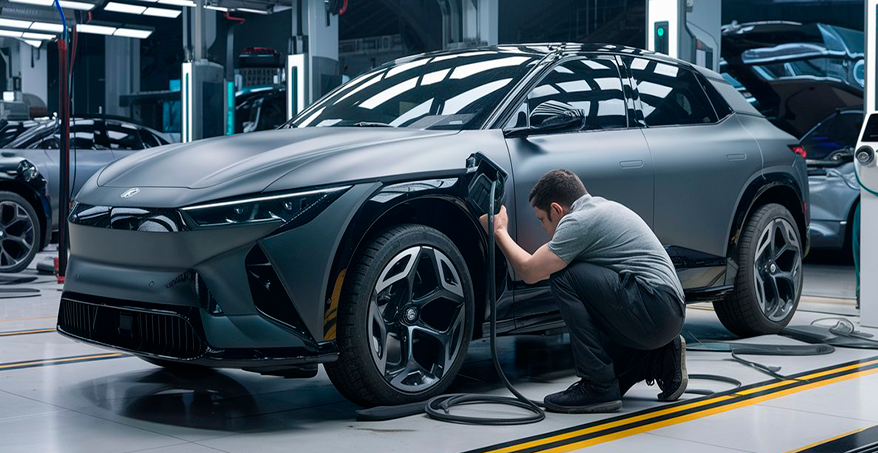Learn the essential maintenance tips every EV owner needs to keep their vehicle running at peak performance.
Electric vehicles (EVs) are reshaping the automotive landscape, offering unmatched efficiency, lower emissions, and a smoother driving experience. Yet, despite their growing popularity, EV maintenance remains a topic of curiosity and, sometimes, misunderstanding. While EVs require less upkeep than traditional gas-powered cars, there are key aspects owners need to understand to maximize performance, extend vehicle lifespan, and avoid unnecessary costs.
Owning an EV is a step into the future of transportation, but proper care ensures your vehicle delivers peak efficiency and reliability.
Let’s explore the essential maintenance tasks, cost expectations, and best practices every EV owner should know.
Battery Health: The Heart of Your EV
An EV’s battery is its most critical and expensive component, making its maintenance a top priority. Lithium-ion batteries, commonly used in EVs, degrade over time, though proper care can slow this process.
- Avoid Extreme Temperatures: Prolonged exposure to very high or low temperatures can degrade battery health. Use climate control features, such as battery heating or cooling, when available.
- Optimal Charging Habits: To prolong battery life, avoid charging to 100% frequently unless necessary. Many EVs allow you to set charging limits, often recommended at 80-90% for daily use.
- Fast Charging Moderation: While convenient, frequent use of DC fast chargers can strain the battery over time. Opt for Level 2 home charging whenever possible.
Regular battery diagnostics, often included during dealership service appointments, can provide insights into your battery’s health and performance.
Tire Maintenance: EVs Wear Them Differently
Tires on EVs experience unique wear patterns due to the added weight of the battery and the instant torque delivered by electric motors. These factors make tire care especially important.
- Monitor Tire Pressure: Proper tire inflation enhances range and prevents uneven wear. Many EVs include tire pressure monitoring systems (TPMS) for real-time updates.
- Rotate Tires Regularly: Follow your manufacturer’s recommended schedule for tire rotations—typically every 5,000 to 7,500 miles—to ensure even tread wear.
- Invest in Quality Tires: Consider tires specifically designed for EVs, which often feature lower rolling resistance and enhanced durability to handle the vehicle’s weight.
Brake System Longevity
Electric vehicles rely heavily on regenerative braking, which uses the motor to slow the car while recharging the battery. This reduces wear on traditional brake components, such as pads and rotors.
- Brake Inspections: Despite reduced wear, routine brake inspections are still essential. Corrosion can develop over time, particularly if the brakes are underused.
- Regenerative Braking Adjustments: Many EVs allow you to adjust the level of regenerative braking. Higher settings can increase energy recovery while minimizing reliance on traditional brakes.
This dual braking system not only saves you money on replacements but also contributes to the efficiency of your EV.
Software Updates: Keeping Your EV Smart
Modern EVs are as much about technology as they are about driving. Manufacturers frequently release over-the-air (OTA) updates to enhance vehicle performance, improve efficiency, and even add new features.
- Stay Updated: Ensure your vehicle is connected to Wi-Fi periodically to download and install updates.
- Visit the Dealer When Needed: While most updates are automatic, certain major upgrades may require a visit to the dealership.
By keeping your EV’s software up to date, you can enjoy the latest advancements without needing to upgrade your vehicle physically.
Cooling and Electrical Systems
Unlike traditional engines, EVs use cooling systems to manage battery and motor temperatures. Ensuring these systems remain functional is key to maintaining performance.
- Coolant Levels: Check and top off coolant as recommended by your EV manufacturer, typically every 5-7 years.
- Electrical System Health: Periodically inspect high-voltage cables and connectors for signs of wear or damage.
Service Costs: What to Expect
EVs are known for their lower maintenance costs compared to gas-powered cars. Without oil changes, timing belts, or exhaust systems, the average maintenance cost for an EV is significantly lower.
- Battery Warranty Coverage: Most EV batteries are covered under an 8-10 year or 100,000-mile warranty, offering peace of mind for major repairs.
- Reduced Annual Costs: On average, EV owners spend about 30-40% less on maintenance compared to internal combustion engine vehicles.
Why EV Maintenance Matters
Proper EV maintenance isn’t just about avoiding costly repairs—it’s about ensuring your vehicle delivers optimal range, performance, and safety. By staying proactive with tasks like battery care, tire rotations, and software updates, you can maximize the lifespan of your investment and enjoy a worry-free driving experience.
As the EV market continues to grow, manufacturers are making it easier than ever to maintain these vehicles, offering tools and resources tailored for owners. Whether you’re new to EV ownership or a seasoned driver, understanding the essentials of maintenance is key to unlocking the full potential of your electric car.


